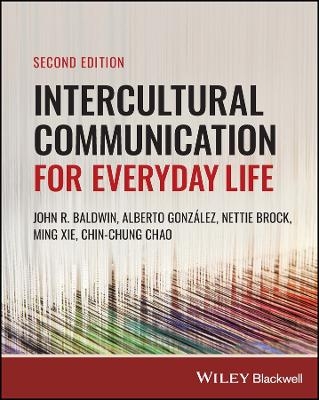
Intercultural Communication for Everyday Life
Wiley-Blackwell (Verlag)
978-1-119-89790-3 (ISBN)
Communication between cultures can be challenging in a number of ways, but it also carries immense potential rewards. In an increasingly connected world, it has never been more important to communicate across a range of differences created by history and circumstance. Contributing to global communities and rising to meet crucial shared challenges—human rights disputes, refugee crises, the international climate crisis—depends, in the first instance, on a sound communicative foundation.
Intercultural Communication for Everyday Life provides a thorough introduction to this vital subject for students encountering it for the first time. Built around a robust and multifaceted definition of culture, which goes far beyond simple delineation of national boundaries, it offers an understanding of its subject that transcends US-centricity. The result, updated to reflect dramatic ongoing changes to the interconnected world, is essential for students of cross—cultural communication and exchange.
Readers of the second edition of Intercultural Communication for Everyday Life readers will also find:
Accessible definitions of core concepts
Revised and updated chapters reflecting the COVID-19 crisis, climate change challenges, and more
An all-new chapter on social media as a tool for intercultural communication
Intercultural Communication for Everyday Life is essential for students and other readers seeking a foundational overview of this subject.
John R. Baldwin, is Professor of Communication and Culture at Illinois State University, USA, where he teaches on culture, diversity, and communication. He has published extensively on these and related subjects over a career spanning more than a quarter century. Alberto González, is Distinguished University Professor in the School of Media and Communication, Bowling Green State University, Ohio, USA. His research is situated at the intersection of criticial intercultural communication and rhetorical criticism. Nettie Brock, is Assistant Professor of Convergent Media at Morehead State University, USA. Her research and teaching concern popular culture texts and their connections to the societies that produce and receive them. Ming Xie, is Assistant Professor in the Department of Political Science and Criminal Justice at West Texas A&M University. Her research focuses on intercultural communication, female leadership in nonprofit organizations, and emergency management. Chin-Chung Chao, is Professor of Communication at the University of Nebraska, Omaha, USA. She is a past President of the Association for Chinese Communication Studies and a past Chair of the Asian/Pacific American Communication Studies Division, and has researched and published extensively on communication, conflict management, and related subjects.
Preface xi
Acknowledgements xv
About the Companion Website xvi
Walk through xvii
Part one Foundations 1
1 Intercultural communication for uncertain times
Why should we know about other cultures? 3
2 Action, ethics, and research
How can I make a difference? 25
3 Origins
How can I talk about culture? 47
Part two Elements 69
4 Subjective culture
What is the base upon which cultural communication is built? 71
5 Identity--Struggle, resistance, and solidarity
How can I think about my identity and that of others? 91
6 Intolerance-acceptance-appreciation-equity-inclusion
How can we make the world a more tolerant and inclusive place? 108
Part three Messages 133
7 Verbal communication
How can I reduce cultural misunderstandings in my verbal communication? 135
8 Nonverbal communication
Can I make nonverbal blunders and not even know it? 156
9 Rhetoric and culture
How does my culture relate to persuasive writing and speaking? 177
10 Media and intercultural communication
How do media shape our views of others? 200
11 Information and communication technologies
How do social media impact culture? 220
Part four Contexts 243
12 Adaptation and intercultural competence
How can I be effective in a new culture? 245
13 Relationships and conflict
How can I have better cross-cultural relationships? 267
14 The political context
How can we use communication to shape politics and culture? 287
15 Intercultural communication in organizations
How does culture shape business and how is business culture changing? 304
Conclusion 328
Glossary 330
Index 343
| Erscheinungsdatum | 24.10.2023 |
|---|---|
| Verlagsort | Hoboken |
| Sprache | englisch |
| Maße | 185 x 231 mm |
| Gewicht | 748 g |
| Themenwelt | Geisteswissenschaften ► Psychologie |
| Sozialwissenschaften ► Kommunikation / Medien ► Kommunikationswissenschaft | |
| Sozialwissenschaften ► Soziologie | |
| ISBN-10 | 1-119-89790-4 / 1119897904 |
| ISBN-13 | 978-1-119-89790-3 / 9781119897903 |
| Zustand | Neuware |
| Informationen gemäß Produktsicherheitsverordnung (GPSR) | |
| Haben Sie eine Frage zum Produkt? |
aus dem Bereich


